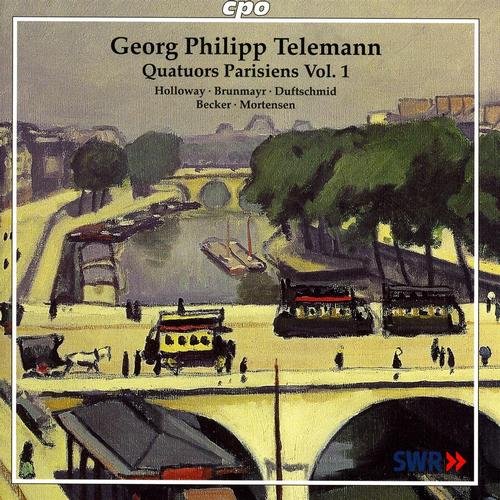
Holloway, Brunmayr, Duftschmid, Becker, Mortensen - Telemann - Quatuors Parisiens Vol. 1 (2009)
BAND/ARTIST: Holloway, Brunmayr, Duftschmid, Becker, Mortensen
- Title: Telemann - Quatuors Parisiens Vol. 1
- Year Of Release: 2009
- Label: CPO
- Genre: Classical
- Quality: FLAC (tracks)
- Total Time: 58:33
- Total Size: 338 Mb
- WebSite: Album Preview
Tracklist:
[1]-[3] Concerto II TWV 43:D1
[4]-[9] Quatuor II TWV 43:a2
[10]-[13] Sonata I TWV 43:A1
[14]-[19] Quatuor VI TWV 43:e4
Performers:
John Holloway, Violin
Linde Brunmayr, Transverse flute
Lorenz Duftschmid, Viola da gamba
Ulrike Becker, Violoncello
Lars-Ulrik Mortensen, Harpsichord
[1]-[3] Concerto II TWV 43:D1
[4]-[9] Quatuor II TWV 43:a2
[10]-[13] Sonata I TWV 43:A1
[14]-[19] Quatuor VI TWV 43:e4
Performers:
John Holloway, Violin
Linde Brunmayr, Transverse flute
Lorenz Duftschmid, Viola da gamba
Ulrike Becker, Violoncello
Lars-Ulrik Mortensen, Harpsichord
The works that have come to be known as Read more quadri (the word “quartet” was not in use in Telemann’s day) for violin, flute, viola da gamba or cello, and basso continuo, consisting of two concertos, two suites, and two sonatas. In 1736–37, these works were reprinted in Paris as Six Quatuors . In 1737, Telemann was able to fulfill a long-held desire of visiting Paris. During his stay, he published six Nouveaux Quatuors , so-called because of the previous printing of his Hamburg quartets. They were written for the same instrumental group as the 1730 publication. In modern times, these two publications were reprinted together as the “Paris Quartets.”
This recording, labeled Vol. 1, is presumably the start of a new set of the complete “Paris Quartets.” For this beginning volume, the performers have chosen two works from each publication. The Concerto in D and the Sonata in A are the second and third works of the 1730 publication, while the Quatuors in A Minor and E Minor are the second and sixth works from the later publication.
The performers are a very accomplished lot. Most of them have appeared on numerous recordings, individually and occasionally with one or two of their colleagues on this recording, generally receiving high praise from Fanfare ’s critics. We are not told if they were brought together for this project or if they occasionally perform together as a group. They sound like an experienced ensemble. Their performances are lively without going to extremes. Rhythms, while not stodgy, are steady. These performers do not think the music requires extremes of tempo or fluctuations in tempo, something indulged in by the Musica ad Rhenum in their complete recording of the “Paris Quartets” for Brilliant. The results show that such extremes are not needed in this music.
This recording, labeled Vol. 1, is presumably the start of a new set of the complete “Paris Quartets.” For this beginning volume, the performers have chosen two works from each publication. The Concerto in D and the Sonata in A are the second and third works of the 1730 publication, while the Quatuors in A Minor and E Minor are the second and sixth works from the later publication.
The performers are a very accomplished lot. Most of them have appeared on numerous recordings, individually and occasionally with one or two of their colleagues on this recording, generally receiving high praise from Fanfare ’s critics. We are not told if they were brought together for this project or if they occasionally perform together as a group. They sound like an experienced ensemble. Their performances are lively without going to extremes. Rhythms, while not stodgy, are steady. These performers do not think the music requires extremes of tempo or fluctuations in tempo, something indulged in by the Musica ad Rhenum in their complete recording of the “Paris Quartets” for Brilliant. The results show that such extremes are not needed in this music.
As a ISRA.CLOUD's PREMIUM member you will have the following benefits:
- Unlimited high speed downloads
- Download directly without waiting time
- Unlimited parallel downloads
- Support for download accelerators
- No advertising
- Resume broken downloads


